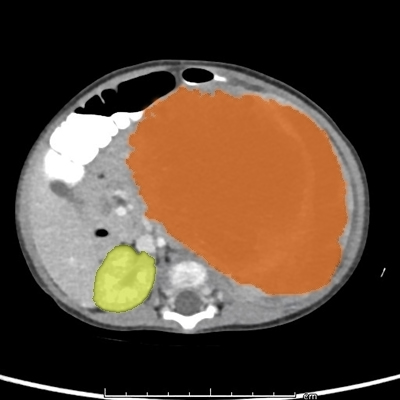Genomics offers new treatment options for infants with range of soft tissue tumours

The results, published today (18 June) in Nature Communications have implications for clinical practice and the diagnosis of rare cancers in infants, and could lead to new, targeted treatment options for these children.
Each year in the UK, over 100 infants under the age of one are diagnosed with rare cancerous tumours in their soft tissues. One of these soft tissue cancers, known as congenital mesoblastic nephroma (CMN), is the most common kidney tumor diagnosed in early infancy. Occasionally spotted as a lump in utero during an ultrasound scan, these tumours are diagnosed definitively after birth. Treatment involves surgical removal of the tumour and sometimes chemotherapy, both of which can damage surrounding tissues at a critical time in life.
The genetic causes underlying these infant cancers are unclear, with over 30 per cent of cases of CMN having no known genetic changes driving the cancer.
In a new study using samples from archives in Germany and Great Ormond Street Hospital, London, scientists from the Wellcome Sanger Institute and their collaborators sequenced the whole genomes and transcriptomes* of 17 CMN tumours, and extended their findings to a total of 350 cases, including CMN and five related soft tissue tumour types: infantile fibrosarcoma (IFS), nephroblastomatosis, Wilms tumour, malignant rhabdoid tumour and clear cell sarcoma of the kidney.
Researchers discovered at least one, if not two, genetic changes in each of the tumours that were driving the cancer. In particular, the genetic data revealed mutations in the Epidermal Growth Factor Receptor (EGFR) in CMN tumours, and both CMN and IFS tumours had mutations in the BRAF gene.
The EGFR mutation identified is targeted by an existing EGFR inhibitor drug called afatinib, used to treat lung cancer, whereas drugs designed to treat melanoma skin cancer target BRAF. It is possible that these existing drugs could help infants with soft tissue tumours, based on their mutations.
“We have discovered new diagnostic markers for soft tissue cancers in infants, including CMN, in which the genetic cause of the disease was unknown in one third of patients. These results indicate which existing drugs could be used to help children overcome these tumours in infancy.”
Dr Sam Behjati Co-lead author from the Wellcome Sanger Institute and University of Cambridge
“Sequencing the whole genomes and transcriptomes of these related cancers showed that while anatomically these cancers appear different, genetically they are very similar. We found mutations affecting EGFR and BRAF, both of which are targets for existing drugs. If infants with very large soft tissue tumours could be treated with these targeted agents, there’s a chance it could shrink the tumour enough that the necessary surgery would be less damaging.”
Dr Grace Collord Co-first author from the Wellcome Sanger Institute and University of Cambridge
“Genomics is changing how we do health research. The genetic diagnostic markers discovered in this study can be readily integrated into routine clinical practice to give confident diagnoses and match patients with soft tissue tumours to the most appropriate clinical trial, helping to make the trials more effective and ultimately help these children.”
Professor Manfred Gessler Co-lead author from the University of Wuerzburg
More information
*The transcriptome is all of the messenger RNA molecules expressed from the genes of an organism. By analysing the transcriptome, researchers can determine when and where each gene is turned on or off in the cells and tissues of an organism.
Publication:
Jenny Wegert et al. (2018) Recurrent intragenic rearrangements of EGFR and BRAF in soft tissue tumours of infants. Nature Communications. DOI: 10.1038/s41467-018-04650-6
Funding:
This work was supported by Wellcome, St Baldrick’s Foundation, the Deutsche Forschungsgemeinschaft (GE 539/13-1) and Deutsche Krebshilfe (50-2709-Gr2, T9/96/TrI, 50-2721-Tr2).
Selected websites
University of Wuerzburg
Home to just under 29,000 students, Julius-Maximilians-Universität Würzburg (JMU) is one of the largest universities in Germany. True to its motto ‘Science for Society’, JMU is committed to advancing research in fields that are relevant for the future, focussing on eight pillars: Life Sciences / Health Sciences / Molecular Chemistry and Materials / Quantum Phenomena in New Materials / Digital Society / Cultural Heritage / Norms and Behavior / Global Changes. Find out more at: www.uni-wuerzburg.de
The Wellcome Sanger Institute
The Wellcome Sanger Institute is one of the world's leading genome centres. Through its ability to conduct research at scale, it is able to engage in bold and long-term exploratory projects that are designed to influence and empower medical science globally. Institute research findings, generated through its own research programmes and through its leading role in international consortia, are being used to develop new diagnostics and treatments for human disease. To celebrate its 25th year in 2018, the Institute is sequencing 25 new genomes of species in the UK. Find out more at www.sanger.ac.uk or follow @sangerinstitute
Wellcome
Wellcome exists to improve health for everyone by helping great ideas to thrive. We’re a global charitable foundation, both politically and financially independent. We support scientists and researchers, take on big problems, fuel imaginations and spark debate. wellcome.org


